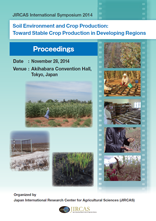Sustainable Intensification Through Improved Soil Health in Smallholder Agriculture

The dryland areas in Asia and Africa are hot-spots of poverty, malnutrition, and food insecurity,
largely attributed to the nexus between land degradation, as well as water depletion and water quality
deterioration, and the quality of life of the people in these resource-poor and marginalized areas. There
is an urgent need to address the issues of land degradation by developing sustainable agricultural
systems through science-based interventions. Many forms of land degradation are largely due to soil
erosion (wind and water erosion), nutrient depletion, imbalanced use of fertilizers and inappropriate
methods used for growing crops including irrigation methods and use of poor quality water in
agriculture following depletion of groundwater as a result of its over extraction.
ICRISAT and its partners have developed innovative farmer-centric and holistic watershed
(catchment) management approach along the whole value chain (from farm to table), adopting a
partnership strategy that involves consortium, convergence, collective action and capacity building.
The use of knowledge-based entry point in promoting collective action has demonstrated on-site
impacts, primarily through rainwater conservation, soil conservation, productivity enhancement
measures along with income generating activities for women and landless people in the catchment. A
number of model watersheds in Asia (India, Thailand, Vietnam and China) have demonstrated the
power of integrated water resource management in unlocking the potential of dryland agriculture
through improved livelihoods of smallholder farmers. The holistic approach has been internalized and
adopted by the Government of India in its integrated watershed management programs. Soil mapping
for all plant nutrients and other fertility parameters has revealed widespread deficiency of zinc, boron
and sulphur along with that of nitrogen (60-100%) in most of the states in India as well as in
benchmark watersheds in China, Thailand, Vietnam and the Philippines.
Using the scaling-up approach since 2009, the mission mode program “Bhoochetana” in Karnataka
state, India has used soil health mapping as an entry point, and has demonstrated the power of sciencebased
interventions by increasing crop productivity on 3.75 million ha of land by 20-66% in 2009-
2012, benefiting 4.3 million smallholder farm families. The benefit cost ratio for various crops in the
30 districts of the state for individual farmers varied from 2 to 14:1; and the total benefit accrued in
terms of gross value of increased crop production reached about Rs. 1267 crores (US$ 230 million).
These results highlight the need to scale-up science-based interventions to sustainably intensify
dryland agriculture to achieve a second green revolution in Asia, and to meet the goals of food and
nutritional security and improved livelihoods through an Inclusive Market-Oriented Development
(IMOD) strategy to benefit smallholder farmers.
| Date of issued | |
|---|---|
| Creator | William Dollente Dar |
| Subject |
Sustainable intensification land degradation soil health mapping integrated watershed management Bhoochetana |
| Publisher | Japan International Research Center for Agricultural Sciences |
| Available Online | |
| Issue | 2014 |
| spage | 16 |
| epage | 30 |
| Rights | Japan International Research Center for Agricultural Sciences |
| Language | eng |
